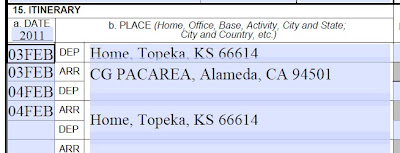By Terri Moon Cronk
American Forces Press Service
WASHINGTON, Feb. 3, 2011 - Lt. Cmdr. Ronda Hartzel is a Navy nurse who worked diligently to maintain her healthy lifestyle. She routinely worked out, ate lots of salads and no red meat, and never smoked. When she found a lump in one of her breasts, she didn't think too much of it.

Lt. Cmdr. Ronda Hartzel, a Navy nurse, met with a reporter from her hospital bed at Bethesda National Naval Medical Center where she is being treated for breast cancer, Feb. 2, 2011, Bethesda, Md.
(Click photo for screen-resolution image);high-resolution image available. | |
"I had a few friends with a bad mammography read, and another whose mom was diagnosed with Stage 4 breast cancer," Hartzel said. "That motivated me to be seen." That was Dec. 31, 2009.
Stationed as an operating room nurse on a fleet surgical team at San Diego Naval Medical Center, Hartzel was diagnosed with Stage 1 breast cancer at age 36. In January 2010, she asked to be reassigned to the National Naval Medical Center in Bethesda, Md., where she had been stationed before.
"But when I got here," she said, "they found it was in my ankle and my hip. So, I was diagnosed with Stage 4 breast cancer, which was pretty devastating."
When the 14-year Navy officer arrived at Bethesda, she said, her long hair was intact and she still felt like herself. She comforted herself with the fact that she had no family history of the disease.
"Slowly but surely, you start to let go," Hartzel said. "Cancer doesn't discriminate. It takes on anybody and everybody."
Hartzel's medical regimen for her breast cancer didn't include radiation. Instead, she had chemotherapy once a week for six months, followed by six months of chemo every three weeks.
She had a double mastectomy in August, followed by removal of her ovaries the day before Thanksgiving. The next day, she ran in a local turkey trot race.
"The doctors didn't want me to, but I wanted to in case I wasn't here next year," she said.
Hartzel received breast implants Dec. 16.
Losing her hair proved the most difficult part of the entire process, Hartzel said. She shaved her head because the chemotherapy made her hair fall out.
"Looking in the mirror, I didn't see myself at all," she said. "I struggled with it, but you get to the point where you have to fight. I learned very quickly if I had a positive attitude and tried to pick myself up, it makes a big difference."
Hartzel said she felt invisible. When people saw her in the hall, most said nothing.
"They wonder what's wrong with you. They want to ask, but don't know what to say to you," she said. "Other people just avoid you, because they can tell something's wrong."
Yet, she said, some positives marked her diagnosis, surgeries and treatments, noting she's had support from the hospital staff, family and friends while soothing the fears of other women with breast cancer.
"The Navy's been great to me, and I've always felt a lot of love and that's why I came [to Bethesda]," she said. "It always felt like home to me."
Still, said Hartzel, who recently was selected for promotion to commander, there are only so many times you can tell your story, especially when you know it's devastating to your friends and family.
"My mother is still struggling," she said. "She's in denial."
After her diagnosis, Hartzel said, she wondered if she could have done something to prevent the cancer.
"I wondered, 'Maybe I should have come in sooner; it might have made a difference,'" she said. "I think I did everything I possibly could. I was in the best shape of my life. I was working out every day. Sometimes you have to realize some things are out of your control."
Cancer can make a person do a lot of bartering, Hartzel said.
"As a Stage 4, I wish I could go back to a Stage 2," she said. "When I was a 2, I wished I could go back to a Stage 1. I decided I'm going to live every moment just like it's my last. None of us knows how much time we have left on this Earth."
Hartzel noted that she just returned from Hawaii. "I don't put things off any more." She said. "I make sure I take the opportunities."
In two or three weeks, Hartzel will have all of her scans repeated to see if the cancer has spread to her bones or anywhere else.
"This could be my last chemo," she said while lying on a gurney undergoing a treatment. "I am determined to be a success story and beat the odds. I want to be one of those 20 percent who lives."






